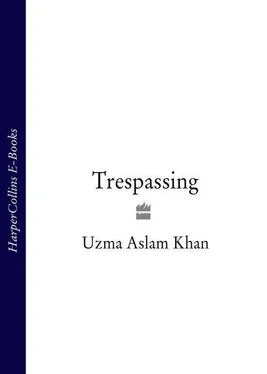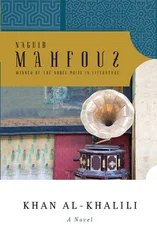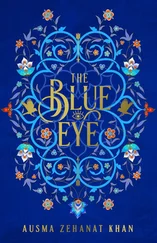He started growing mercurial about her work. Sometimes, her design samples delighted him. Silk-screen or batik, embroidery or paint, he went through her portfolio meticulously, commenting on the materials, colors and patterns, encouraging her to set up her own shop when they went home and got married. He listened for hours as she spoke of the dyes and astringents, of the madder-dyed cloths found in the ancient site of Moenjodaro, so near Karachi. She wanted to revive all that. He said she must. Her heart raced as she wondered how, and whether he would really want her to. Then, just as she convinced herself he would, his mood changed. He stopped listening, stood up, suggested a stroll, or else admonished her for being too ambitious.
‘Too ambitious for whom?’
But he’d take her hand and laugh it off, leaving her to yearn increasingly for an answer.
It happened at last many weeks later, as they sat on the pavement outside a kebab shop. It was still chilly but the clouds had lifted. Sweaters and stockings came off. Cafés with outdoor seating bustled. Riffat rolled a cigarillo-slim kebab between a hot, sesame-sprinkled naan and bit in. She scooped the grease off her chin and sighed. ‘When we’re back in Karachi, I want you to take me to all those roadside cafés my family insists women should be protected from.’
The upper corner of his lip twitched. For the briefest instant, a dark flint cut his sparkling amber eyes. He took a sip of lassi and said nothing but his face closed. She wondered if he’d looked like this that day he walked out the door, without showing her his face.
She took another bite. ‘This is our cuisine, after all. A shame half our population can’t enjoy it like this.’
He pushed his plate back. ‘You sound so immature when you talk that way.’
‘Immature?’
‘Irrational then. It’s not done, Riffat. You can’t transport something that exists here to another place.’
She blinked, genuinely confused. ‘Something? Like what?’
‘Like another system. You know perfectly well it doesn’t look good for a woman to eat in those cafés. Men ogle. And if she’s with a man, they want to know why he can’t shield her from their lust. He looks even worse.’
She put down her sandwich. It was slowly making sense. ‘Democracy, health care, and education can come from within our system?’
‘Of course.’
‘But when women appear in public as frequently and comfortably as men, that’s an import? An evil outside influence?’
He shrugged. ‘Some things will take longer.’
‘Because some people want them to? Could it be the same people who speak so eloquently of new wheels turning?’
He raised a brow and looked around. The couple at the next table was laughing and had noticed nothing. A few others lingered on the pavement, waiting for a table to clear. ‘Maybe we should hurry up so they can sit down.’
She grabbed his hand. ‘No. This time you’re going to answer me. You want efficiency, hygiene, and a free press — but not that modernity should benefit women. You want one you can keep putting to the test, just like your mother?’
He snatched his hand away. ‘Don’t start on my parents again.’
‘Are you speaking for me? Do you even know how like our very own general you sound?’
He walked away but she came to his hostel later in the evening, and they argued more. She hounded him for days, hating what she was becoming, she, whose strength was grace and elegance, who was regal as an empress. She was driven to teary stridency, begging him to give her what should have been hers, forced to sink to the degradation of demanding it. At last, he snapped: No, he wouldn’t be the one to stay home with the children, or attend to her phone calls or arrange her meetings. Never. That was her job. His was to fight for freedom.
JULY 1968–JULY 1972
Her mother said she’d found the perfect match: Mr Mansoor owned a textile mill and would be open to suggestions from a designer like her. Furthermore, he would let her establish her own silk line if she so desired.
Riffat did not want to meet him or see his photographs. She wanted to remain a petrified shark tooth. Meeting the groom-to-be or even knowing what he looked like might prompt her to live again. She was just the kind of smooth granite that later made her break down when she saw other brides.
But she held on to one dream. As a wedding gift, her father gave her several acres of land outside Karachi. She’d do something with this land, something for herself, something that allowed her to sow all the turmoil and bliss of her London days. She was going to revive what had lain latent for thousands of years. She’d watch it grow into something soft and durable, so that when she, a tiny speck in time, vanished, it would still be there. Somewhere between the mulberry seeds and the yarns of indigo-washed silk, Riffat Mansoor learned to find her place in the universe again. She stepped outside the cocoon of the marble-bride and moved on.
But first, she had children. And before that, she looked at her groom.
He was everything Shafqat wasn’t: fair-skinned, slouch-shouldered, tire-necked, short. How long does it take a woman to get accustomed to a man who repulses her? That’s what she asked herself while lying under Mansoor, barely breathing while he pushed inside her on their wedding night. She somersaulted like a little top, a tiny feather in the mattress torn by springs. How long?
She knew well that another man would have left her the morning after, when the sheets weren’t stained. But he said nothing. He seldom did. He had none of Shafqat’s eclectic knowledge. He didn’t get her laconic humor and offered none of his own. He played no delightful games, hated to walk, over-ate, and had absolutely no flair for conversation. When he spoke it was to grunt something about food, funds, and fabrics. About the latter, she joined in heartily, and throughout their nineteen years of marriage, he remained in awe of the confidence with which she did. He was one of the few who never discouraged her mulberry scheme. He was, from the day they married till the day before his death, deferring and suspicious. When he touched her he remained, as on the first night, so clumsy she developed a second skin, something that would molt and drop off after he fell asleep. In the finer, bottom layers dwelt the farm. And, underneath it all, Shafqat.
He tiptoed down the staircase of her sleep, stealing into keyholes, wriggling under cracks, helping himself to her rooms. She sealed these off, but then he’d slink into another, stretch out, flash his grin. She felt her insides had been completely and utterly violated and was left with no choice but to move into the gaping holes. The loneliness that engulfed her then was the worst agony ever known.
He came to her their fourth year apart. She had two children, he one. She welcomed him as she’d done in London after their first fight, when he’d brought the yellow roses. And then she threw him out for ever.
AUGUST 1992
Riffat looked at Sumbul’s child staunchly refusing to die. He whimpered and wheezed, and Sumbul told Riffat she wished the end would come quickly now. Riffat was about to tell her again that she could take a few days off, but she knew why Sumbul came to the farm. Home meant a mother-in-law working her from dawn till midnight, a belligerent husband who sometimes beat her, three other children, countless neighbors pouring in for gossip and meals bought with her money, an open sewer outside the kitchen, and absolutely nowhere for her to sit quietly for two minutes and sip her very own cup of tea. If she tried, the other women would snap, ‘We never had such luxuries at your age.’
Читать дальше
Конец ознакомительного отрывка
Купить книгу












